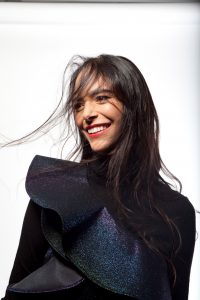

Rapa Nui belongs to Chile the way Hawaii belongs to the United States. Since European explorers first set foot there on Easter Day 299 years ago, the lonely speck of rock—“Easter Island”—has haunted the world’s dreams as the realm of the moai, guardian spirits in stone, monumentally arrayed along the shore, their backs to the Pacific.
Growing up in their shadow, a nine-year-old named Mahani Teave fell under the spell of an object scarcely less numinous: Rapa Nui’s very first piano, a humble upright. The visitor from abroad who had shipped it over had scarcely moved in when little Mahani appeared at her door, not to be turned away. Thus her studies began. Who could have guessed that in time this child of the island—born to an American mother and a local father—would emerge as an international concert pianist? Lang Lang, her rock-star colleague from the backwater of Shenyang, likes to quote a Chinese proverb to the effect that a journey of a thousand miles begins with a single step.
In the end, every career is a moonshot. It wasn’t long before Teave’s mother whisked her to Valdivia, in southern Chile, for more professional instruction. In her late teens, Teave began graduate work at the Cleveland Institute of Music, followed six years later by three years at the no less prestigious Hochschule für Musik Hanns Eisler, in Berlin. Still in her 20s, Teave had begun to make her mark in selective competitions and on the concert circuit. Yet Rapa Nui was calling her back. “There was this umbilical cord connecting me to the island,” Teave recalls. “‘Honey,’ it was saying, ‘you’ve had all these opportunities. There are lots of other children back home waiting to have them, too. Only you can do this.’”
Directed by John Forsen with narration by Audra McDonald, the new documentary Song of Rapa Nui fills in colorful details of Teave’s formative years. In addition, it chronicles the construction of her school—a facility of airy Mediterranean grace built from six years’ worth of flat tires, tin cans, and empty bottles set into the walls like chunks of stained glass. Of course, it took a village. In addition to Teave, the NGO Toki Rapa Nui’s Web site lists eight co-founders, among them a construction engineer, an obstetrician, a lawyer, and an architect, all of whom also sing, write songs, or dance. The curriculum includes individual lessons in piano, violin, and cello, as well as classes in music appreciation and traditional arts. There’s even a farm modeling sustainability and food sovereignty, critical values for an island too long dependent on air shipments of all essentials—and critical likewise for Spaceship Earth.
Teave’s burgeoning responsibilities have not eclipsed her love for the piano or performance. In other news, the pianist has just released her first CD, a recital ranging from Baroque selections of Bach and Handel to the virtuoso fare of Chopin, Liszt, and Scriabin. It closes with an island song, first chanted in the traditional manner, then elaborated on the keyboard.
On Zoom, Teave reflected on her personal history, her musical passions, and the challenges for her island and her school. Read the full interview here


